Chinese had the 'front door' with Hunter Biden: Rep. Darrell Issa
https://www.youtube.com/watch?v=-QiArczr2FE
Is that not what the Democrat Party has created right here n America, transforming a once prosperous, strong, united, and safe nation into a debt-laden, militarily weak, socially divided, and increasingly dangerous society? Here are some of the Bizarro policies and beliefs inflicted on us by the neo-socialist, globalist, anti-American Democrat Party over the past few decades
— PAUL E. SCATS
Antony Blinken Checks in with Chinese Foreign Minister for Routine Scolding
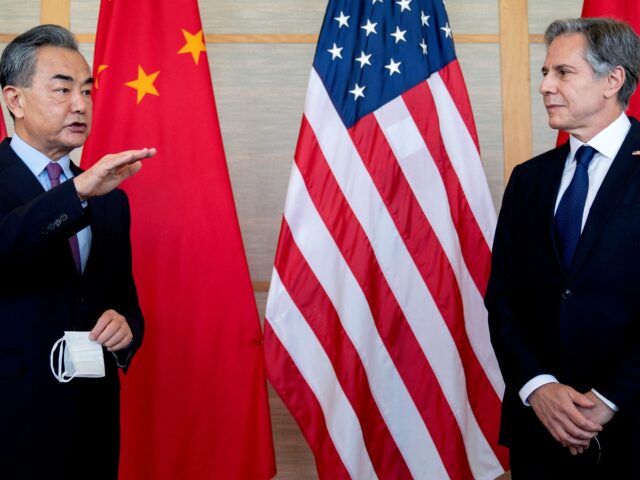
Secretary of State Antony Blinken held a phone conversation with his Chinese counterpart Foreign Minister Wang Yi on Monday in which the latter chided Blinken to “stop trying to put up new obstacles to bilateral relations.”
The State Department readout of the call, published on Sunday (the call appears to have taken place on Monday Beijing time), does not mention anything that Wang said, instead focusing on Blinken, who allegedly “raised Russia’s war against Ukraine” and the “security situation in Haiti.” The Chinese Foreign Ministry and the government, through state propaganda outlet Global Times, offered much more specificity, depicting a frustrated Wang hectoring Blinken to urge the administration of left-wing President Joe Biden to stop trying “to contain and suppress China.”
The tone echoed that of multiple past encounters between the two, as well as discussions held between Blinken and other Chinese Communist Party envoys, in which aggressive Chinese representatives badgered Blinken over his government not acting sufficiently in the best interests of China. The pattern began after a disastrous meeting between Blinken and National Security Adviser Jake Sullivan and Wang and senior Politburo member Yang Jiechi in Alaska last year during which Yang ranted for 16 minutes about alleged racism and “Black Lives Matter” in America.
“On human rights, we hope the United States will do better on human rights. China has made steady progress in human rights, and the fact is that there are many problems within the United States regarding human rights, which is admitted by the U.S. itself as well,” Yang protested in Alaska. “The challenges facing the United States in human rights are deep-seated. They did not just emerge over the past four years, such as ‘Black Lives Matter.’ It did not come up only recently.”
The Biden representatives notably did not mention the fact that China is currently engaging in genocide against majority-Muslims groups in occupied East Turkistan, among other Communist Party atrocities.
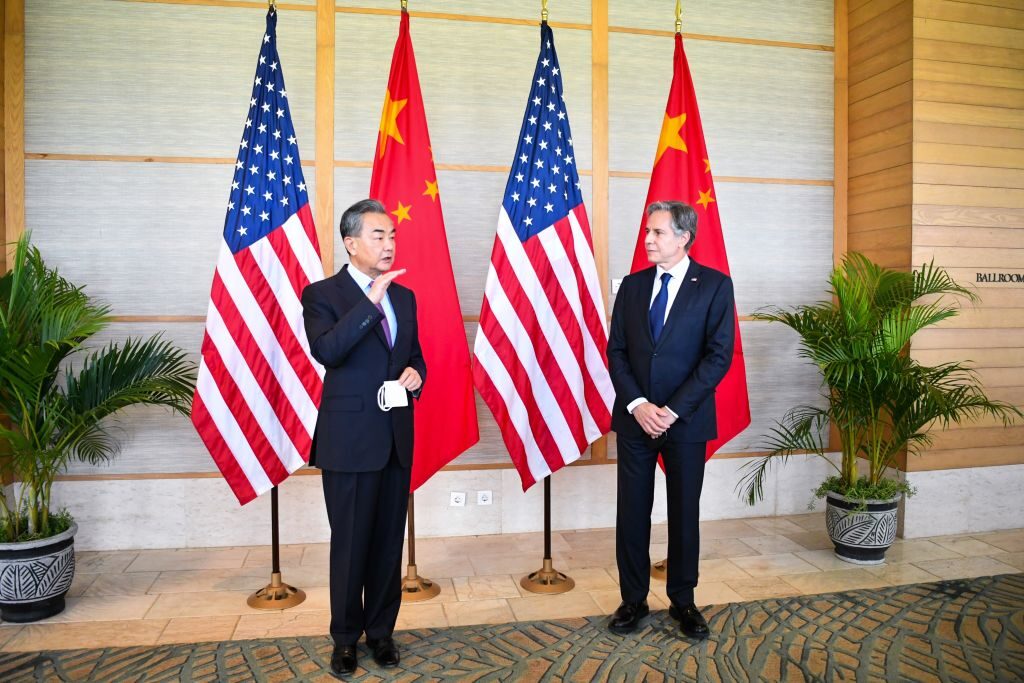
Chinese State Councilor and Foreign Minister Wang Yi L meets with U.S. Secretary of State Antony Blinken, a day after the Group of 20 G20 foreign ministers’ meeting, in Bali, Indonesia, July 9, 2022. (Xu Qin/Xinhua via Getty Images)
According to the State Department, Blinken “discussed the need to maintain open lines of communication and responsibly manage the U.S.-PRC [China] relationship” with Wang, adding no more detail on what would presumably be the most important issue between the top diplomats of the U.S. and the People’s Republic of China.
“The Secretary raised Russia’s war against Ukraine and the threats it poses to global security and economic stability,” the readout continued. “The Secretary also noted the deteriorating humanitarian and security situation in Haiti and the need for continued coordinated action in support of the Haitian people.”
In contrast, the Chinese Foreign Ministry depicted a fuming Wang berating Blinken on American foreign policy.
“The US side should stop its efforts to contain and suppress China, and not create new obstacles to the relationship between the two countries,” the ministry paraphrased Wang as saying. “Wang Yi pointed out that bringing China-US relations back to the track of stable development is not only in the common interests of China and the US, but also the general expectation of the international community.”
The Global Times claimed that Wang spent much of the call pressuring Blinken to closely study the 2022 Communist Party Congress, which concluded last month and cemented dictator Xi Jinping’s stranglehold on power. The Congress, which occurs every five years, determines who remains or gets promoted to the Politburo, the highest authority in the Party. This year, Xi removed several top officials on the basis of their advanced age, replacing them with a host of loyalists that are unlikely to question controversial policies such as an endless wave of city lockdowns to fight Chinese coronavirus.
The Congress was also the site of a bizarre scene in which elderly former President Hu Jintao, who preceded Xi Jinping in power, appeared to be hauled off violently by security while pleading with Xi for mercy. Hu has not been seen in public since his apparent purge was caught on camera.
Wang, the Global Times said, essentially assigned Blinken to read Xi Jinping’s report to the Congress as homework.
“If the US truly wants to know about China, it should carefully read the report, Wang said, noting that China’s domestic and diplomatic policies are open and transparent and its strategic intention is frank and forthright,” the state newspaper relayed, “and the US should not make subjective conjectures, nor be blinded by its ideological prejudice.”
It also repeated Wang’s lecture on respecting the genocidal communist Chinese government.
“When talking with Blinken, Wang pointed out that bringing bilateral relation back on track is not only in accordance with the two countries’ mutual interests, but also what the international community expects,” the Global Times reported. “The US should stop cracking down on China, and also stop trying to put up new obstacles to bilateral relations, Wang urged.”
The state newspaper nonetheless described the phone call as “positive” and potentially an avenue for future high-level talks, including a possible meeting between Biden and Xi. Biden and Xi are both expected to attend the G20 summit in Indonesia this month, but have not made any official announcements on meeting. As of Monday, the Chinese Foreign Ministry denied having any information on a potential in-person discussion between the two leaders.
The G20 is expected to be an explosive meeting this year due to its invite list, which not only includes Biden and Xi but both Russian leader Vladimir Putin and Ukrainian President Volodymyr Zelensky, whose nations are currently at war. Biden has publicly demanded Indonesia disinvite Putin to no avail.
Also expected to attend is Saudi Crown Prince Mohammed bin Salman, whose relationship with Biden is arguably the world’s most deteriorated. The White House has denied any plans for Biden to meet with the crown prince amid a growing diplomatic crisis triggered by Washington accusing Riyadh of supporting OPEC oil production cuts to support Putin. The Saudi government has reacted to the accusation with outrage and received support from Zelensky. Saudi officials have also taken Biden’s strident stance as an indication to enhance diplomatic ties with China.
At least year’s G20 summit, Blinken and Wang repeated their regular scolding sessions on the issue of Taiwan, which did not reportedly come up during this week’s call. Taiwan is a sovereign, democratic nation off the coast of China that has long sought relations with America. Beijing falsely claims Taiwan as a province of China and regularly pressures America to cut economic and strategic ties with Taipei, even though Washington does not recognize Taiwan as a country.
“We urge the United States to realize the serious harm of the ‘Taiwan independence,’ to pursue a real one-China policy, instead of a fake one, to fulfill its commitments to China faithfully rather than treacherously,” Wang demanded last year.
Wang also complained about specific legislation in the American Congress at the time, meddling in domestic affairs.
“The United States has wantonly interfered with China’s internal affairs, Wang stressed, noting that the current U.S. Congress has introduced more than 300 anti-China bills,” Xinhua reported, “and the United States has included more than 900 Chinese entities and individuals in various unilateral sanctions lists, which severely disrupted the normal bilateral exchanges.”
Follow Frances Martel on Facebook and Twitter.
China Working To Undermine Midterm Elections, Cybersecurity Group Says
China, Russia, Iran sowing dissent ahead of midterm elections
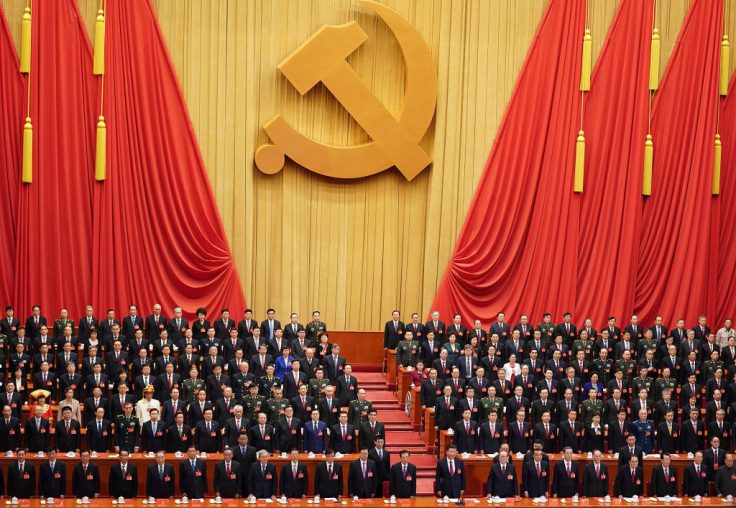
Communist China is behind a massive online disinformation campaign aimed at undermining the upcoming U.S. midterm elections, according to findings by a cybersecurity group.
China is using a network of social media accounts and altered news articles to "sow division both between the U.S. and its allies and within the U.S. political system itself," according to a threat assessment by Mandiant, a cybersecurity and intelligence organization that works with governments and the public sector. China’s latest efforts to undermine the American democratic process come amid parallel attempts by Russia and Iran to interfere with the upcoming elections.
The CCP influence operation, dubbed Dragonbridge, is attracting concern in the cybersecurity sector for its "aggressive attempts to discredit the U.S. democratic process, including attempts to discourage Americans from voting in the 2022 U.S. midterm elections," according to Mandiant’s research. The organization assesses "with high confidence" that the online campaign is "operating in support of the political interests of the People’s Republic of China."
Efforts by foreign actors to meddle in the upcoming elections have fueled concerns among federal authorities, including the FBI, which recently warned that an Iranian government-backed hacking collective is working to target U.S. entities. Russia also "is working to amplify doubts about the integrity of U.S. elections" as voters head to the polls next week, according to the Associated Press.
The CCP’s Dragonbridge operation has similar hallmarks to those of other foreign actors, according to Mandiant. Dragonbridge, through a network of online social media accounts that obfuscate their true identity, is promoting "narratives that appeared intended to discredit and undermine the U.S. political system."
In September, for instance, Dragonbridge-affiliated accounts posted an English-language video on online platforms that included "content attempting to discourage Americans from voting in the upcoming U.S. midterm elections." Like the efforts helmed by Russia and Iran, China wants to sow doubts about "the efficacy of voting and of U.S. government institutions more broadly," according to Mandiant.
The video, portions of which were captured by Mandiant, claimed "the solution to America's ills is not to vote for someone," but to "root out this ineffective and incapacitated system"—a narrative that mirrors those promoted by U.S.-based radical groups on the left and right.
Chinese operators also promoted rhetoric meant to divide Americans and reinforce the impression that the country is irrevocably broken.
Dragonbridge content collected by Mandiant promotes the narrative "that political infighting, partisanship, polarization, and division had become fundamental aspects of American democracy. The campaign also pointed to frequent mentions of ‘civil war’ on social media and incidents of politically motivated violence, including confrontations between individuals supporting opposing parties and acts against the FBI, as evidence of the deterioration of the political process and its impending demise."
The group also has been observed altering actual news articles and pushing content that appears to be legitimate but is actually the product of CCP manipulation.
Throughout the 2022 election cycle, the CCP-orchestrated campaign has exhibited "aggressiveness through both the content of its narratives and its willingness to experiment with new tactics to accomplish its aims," according to Mandiant. This includes attempts to mobilize American protesters to take to the streets and potentially commit violent acts.
"Such persistence, combined with clear intent and scale, renders the campaign a priority for monitoring," the security group warned.
John Hultquist, head of threat intelligence for Mandiant, said in a statement that while Russia and Iran are more aggressive in their efforts to undermine U.S. elections, "what’s troubling [about the CCP groups is] their aggressive growth."
The man now widely believed to be Peng Lifa reportedly disguised himself as a construction worker to get atop Beijing’s Sitong Bridge and hang up two banners — one reading, “No PCR tests, but food; no lockdowns, but freedom; no lies, but respect; no Cultural Revolution, but reform; no dictator, but vote; no [to being] slaves, but we the people” and another reading “students strike — workers strike — people strike — dictator traitor Xi Jinping.”
Elderly Chinese Ex-President Hu Jintao Hauled Out of Communist Event as Xi Jinping Watches
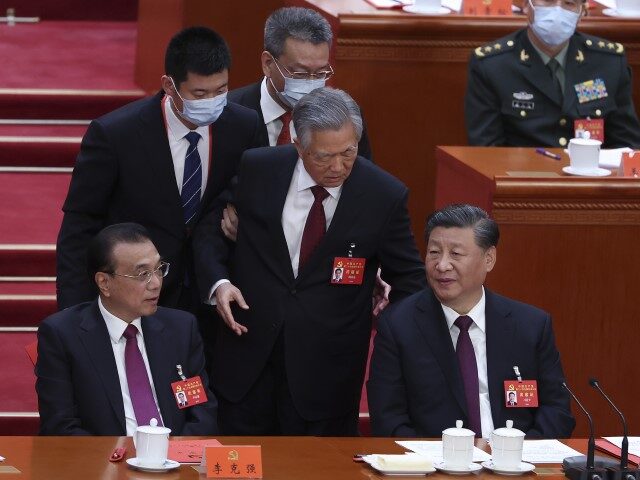
The Chinese Communist Party Congress, an event occurring every five years to appoint Party leaders and determine future priorities, ended with a dramatic climax on Saturday in which two officers appeared to manhandle and expel 79-year-old former President Hu Jintao from his seat, clearly against his will.
Hu served as president and chairman of the Communist Party prior to current dictator Xi Jinping, who assumed an unprecedented third term at the helm of the country on Saturday following a vote by the communist elite. The vote occurred shortly after the very physical removal of an apparently frail Hu, who was seated less than one foot from Xi and appeared to plead for the dictator to intervene and prevent his expulsion, to no avail.
Hu’s tenure was largely marked by his failure to assert himself as national dictator or a major influential personality in the Party, even as leader. It is also notable in that it ended voluntarily, after Hu chose to step down and allow then-Vice President Xi to take over in 2013. At the time, Xi applauded him for his “deep consideration toward the development of the Party, the country and military” and “noble character” in resigning.
Video captured by Agence France-Presse (AFP) on Saturday morning Beijing time showed two men abruptly approach Hu, who had not behaved in any apparent disruptive way prior to the incident, and take away his official paperwork. The men then begin grabbing Hu under his arms and dragging him away. Hu appears to try to take Xi’s papers, as the dictator is seated beside him, but Xi holds his papers down. Xi and Premier Li Keqiang, seated next to Xi, appear to calmly nod in Hu’s direction as he is dragged away wearing an expression of fear.
Adding to the intrigue is an apparent attempt by Party official Li Zhanshu, seated on the other side of Hu, to stand up and help him as the men begin grabbing him, but Xi ally Wang Huning grabs his arm and discourages him from intervening.
The men dragging Hu away do not appear to be mere security guards, as they are wearing Party name tags. Online observers identified one of the men as a top Communist Party official, Kong Shaoxun.
The Communist Party has not yet, at press time, explained what happened to necessitate Hu’s removal, which many international observers have described as shocking and humiliating for the elderly former president. Adding to suspicions that he may have been preparing to vote against a third term for Xi as chairman of the Party is the fact that the Chinese government moved rapidly to censor any mentions of Hu or the incident at the Party congress on Weibo, the state-controlled social media site.
“Search results for ‘Hu Jintao’ on China’s Twitter-like platform Weibo appeared to be heavily censored Saturday afternoon, with the most recent result dated Friday and posts limited to those of official accounts,” AFP observed.
The state-run propaganda outlet Global Times published an extensive, glowing report on Saturday’s Congress session that entirely omitted any mention of Hu Jintao, focusing instead on Xi’s supremacy within the Party.
“The week-long 20th National Congress of the Communist Party of China (CPC) successfully concluded on Saturday in Beijing, and it noted that the establishment of Comrade Xi Jinping’s core position on the Party Central Committee and in the Party as a whole,” the Global Times reported, “and the guiding role of Xi Jinping Thought on Socialism with Chinese Characteristics for a New Era has set the rejuvenation of the Chinese nation on ‘an irreversible historical course.'”
The newspaper did not note that any single member of the Party objected to Xi’s permanence in power, claiming that his “re-election” “required all Party members to acquire a deep understanding of the decisive significance of this major achievement, more conscientiously uphold Comrade Xi Jinping’s core position … and uphold the Central Committee’s authority and its centralized, unified leadership.”
No Communist Party Congress coverage in the Global Times mentioned Hu at all this week, despite his presence at the opening event along with a host of other retired officials.
The Xinhua News Agency, another official Chinese government outlet, published photos from Saturday of Hu seated alongside Xi Jinping. It also published an explanation of the events on Twitter – a social media outlet Chinese citizens who are not high-ranking Party officials cannot access.
Xinhua claimed that Hu “insisted on attending the closing session” despite needing to “recuperate” and that he “was not feeling well” when two men violently ousted him from the event.
“Now he is much better,” the government mouthpiece claimed.
Foreign Policy‘s James Palmer observed that Hu is nearly the last of his cohort in the Party, as Xi Jinping’s routine purges of those he does not consider loyalists have imprisoned or otherwise silenced nearly all of Hu’s allies.
“Many of his former allies have been arrested in Xi’s purges, most notably his chief aide Ling Jihua in 2015,” Palmer wrote. “Hu was associated with a power network of former leaders, like himself, of the Communist Youth League; that faction appears to have been effectively destroyed.”
He speculated that a variety of possibilities could have resulted in the strange incident – from Hu indeed suffering a health incident or a dementia-fueled episode to the chance that “information suddenly came up that made Xi — who would have had to personally approve any such move — afraid that Hu might abstain or even vote against him in the rounds of otherwise unanimous voting that finished off the Party Congress.”
“That could have been a remark by Hu to his former colleagues backstage or perhaps even signs of dementia that caused a sudden panic that something might go wrong. That would make Hu’s confusion understandable,” Palmer mused.
Yet prior incidents of elderly Party members embarrassing themselves, or Xi, have occurred largely without punishment. During the last Party Congress in 2017, Jiang Zemin, the president who preceded Hu, spent most of Xi Jinping’s three-hour speech yawning, sleeping, checking his watch, and reading, clear signs of disrespect. Jiang was 91 at the time and became a sensation on Chinese regime-controlled social media outlets with only minimal censorship.
Currently 96, Jiang did not attend this year’s Congress, though few questioned his absence.
Feds Charge 7 Chinese Nationals Over Plot to Repatriate U.S. Resident to China
Eight-count indictment is latest case by Justice Department targeting Beijing's expatriation campaign in U.S.
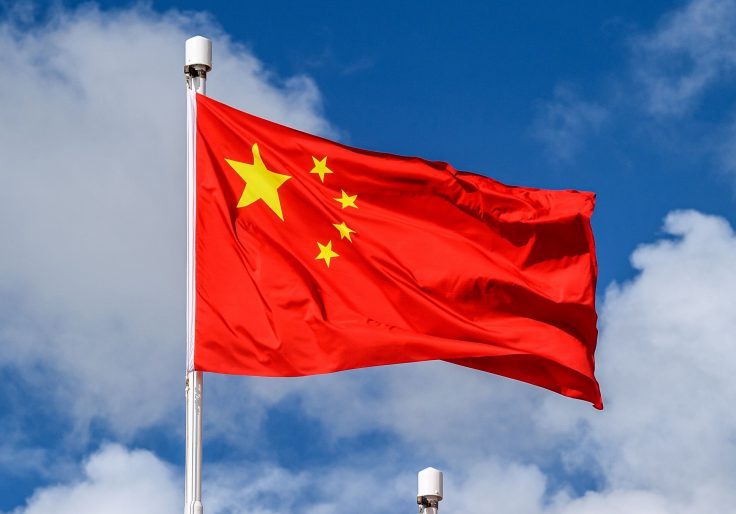
By Sarah N. Lynch
WASHINGTON (Reuters)—The United States unsealed criminal charges on Thursday against seven Chinese nationals accused of waging a surveillance and harassment campaign against a U.S. resident and his family, in a bid by the Chinese government to repatriate one of them back to China.
The eight-count indictment, unsealed in a U.S. District Court in Brooklyn, New York, is the latest case by the Justice Department targeting China's apparent expatriation campaign, known as "Operation Fox Hunt."
The seven individuals charged are Quanzhong An, 55, of Roslyn, New York his daughter Guangyang An, 34, and five others still in China: Tian Peng, Chenghua Chen, Chunde Ming, Xuexin Hou, and Weidong Yuan.
The lead defendant, Quanzhong An, and his daughter were arrested on Thursday morning. The rest of the defendants remain at large. The United States does not have an extradition treaty with China.
According to the indictment, Quanzhong An is accused of working at the behest of China's Provincial Commission for Discipline Inspection to harass and intimidate a Chinese man and his son living in the United States. The man and his son are identified only as "John Doe-1 and John Doe-2."
As part of the plot, the defendants allegedly coerced a relative of the family to travel from China to the United States in a bid to convince John Doe-1 to return to the country.
At a meeting in a restaurant in Sept. 2018, the relative explained to John Doe-2 that he had been forced to travel there by the government as part of a plan to repatriate the 100 most-wanted fugitives, the indictment said.
Other examples of harassment the family endured included a letter-writing campaign, with one letter warning that "coming back and turning yourself in is the only way out."
The Chinese government also filed a lawsuit against the father and son in a New York state court, claiming the father had stolen money from a Chinese employer and his son illegally profited from the scheme.
"The victims in this case sought to flee an authoritarian government, leaving behind their lives and family, for a better life here. That same government sent agents to the United States to harass, threaten, and forcibly return them to the People's Republic of China," said Michael Driscoll, the FBI's assistant director in charge in the New York office.
(Reporting by Sarah N. Lynch; Editing by Bill Berkrot)
No comments:
Post a Comment